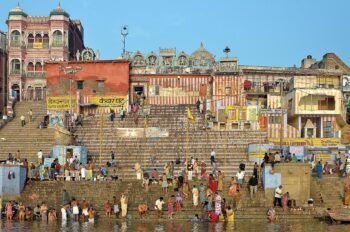Analysis
Prologue
How easy is it for any of us to contemplate leaving everything behind for a peaceful life in nature? Or for the pursuit of a higher goal than ourselves? I bet not really easy.
On one side stood Swami Ji’s parents, siblings, career, and business, while on the other hand, the true calling of his soul. He refused to play the same game as others, with our daily struggles behind material pursuits. He wanted the pursuit of a higher purpose, for “..a true inner life”.
The First Step: Varanasi
“The vehicle hadn’t changed but the direction had; the person hadn’t changed but the priorities had.”
 There are strong indications of contemplations of old Bharat. The first mention of RAKS when offering Mahesh his sandals. Swami Ji reminds us to do our duties irrespective of who is in front of us, “Please put them on his feet as you would do for any other customer..” Our karma and sense of sharing are our own. These should not be dependent on the other person. Each one has his/her own karma.
There are strong indications of contemplations of old Bharat. The first mention of RAKS when offering Mahesh his sandals. Swami Ji reminds us to do our duties irrespective of who is in front of us, “Please put them on his feet as you would do for any other customer..” Our karma and sense of sharing are our own. These should not be dependent on the other person. Each one has his/her own karma.
“O Arjuna, as the ignorant perform actions with attachment and hope of reward, so the wise should act with dispassionate nonattachment, to serve gladly as a guide for the multitudes”. BG Chapter 3, verse 25
Reference is made to “..performing a cosmic dance”, which is reiterated in the Ancient Science of Mantras, “Shiva, the Nataraja was performing his cosmic dance, Mahatandava.” Swami Ji is concentrating on the feet of Mahesh as if coaxing those to heal from the tribulations of being “..barefoot..” on “..the road was like a field of burning coal.” In this context, the cosmic dance is necessary for creation to take place. Concentrating on the feet of Mahesh, who had seen suffering was given a new pair of sandals.
When should someone bow his head to anybody? To always practice humility, but ever so “..in front of God..elderly..your guru.” There are no shortcuts to experiences in life.
Swami Ji reflects on the circumstances of living decently which remains a challenge for a certain category of people. This part reminds me of the poignant themes of poverty, hunger and destitution as discussed in Freedom at midnight by D. Lapierre and L. Collins. The time and people have changed, but the circumstances clearly remain as sensitive for certain people.
Life is full of challenges. Just like the elasticity of a string is challenged on the Sitar, yet the player soothes Brahma Naad from it, the same happens to our will. We should never give up.
“..feeling tired and hopeless..wondering how to proceed..there it was..”
What is the worst part of anything? Carrying its load. We become so habituated to the pain of holding the glass of water for an extended period of time, that we cannot imagine life without that pain. Pain becomes our constant companion because we seem to like it. We must let go of it.
“..weight has a way of becoming a part of your life. Only when you take it off your back and feel the lightness does the awareness of the load hit you.”
How easily Swami Ji peeps into our souls and understands our minds, “I realized that he didn’t really know the area; he has lied to me.” An interesting parallel has to be drawn here from Om Swami, As We Know Him (I. Tandon & S. Vidyananda Om). It further corroborates this divine aspect of Swami Ji, “He reads your thoughts. He sees yours intentions, your fears, your worries..”
Acceptance
It is said that only when you are willing to accept and desist from resisting change that the journey can begin. Imagine water resisting the shape of a vessel. Only when it is free and flows easily can water mould everywhere, ice doesn’t. Swami Ji shows us the part where he is as human as anyone is, but yet he is beyond. We see the start of the journey of a great man who transcends the limitations of the mind and physical comforts. A man who will brave storms, biting frost, hunger and impossible challenges for the physical body, mind and spirits. How does Swami Ji brave all these challenges? Stay tuned!
Please accept my sincere apologies Dearest Swami Ji! Your memoir is the lighthouse that guides my lost soul in this vast sea of material temptations.
References:
Om Swami, 2014. If Truth Be Told, A Monk’s Memoir. India: Harper Element, pp.4,6,7,9,11.
I. Tandon & S. Vidyananda Om, 2016. Om Swami, As We Know Him. India: Harper Element, pp.21.
Om Swami, 2017. The Ancient Science of Mantras, Wisdom of the Sages. India: Harper Element, pp.8.
Bhagavad Gita. Chapter 3 Verse 25
Featured image made with Canva.
Picture Credits: Pixabay
Thank you









Comments & Discussion
6 COMMENTS
Please login to read members' comments and participate in the discussion.